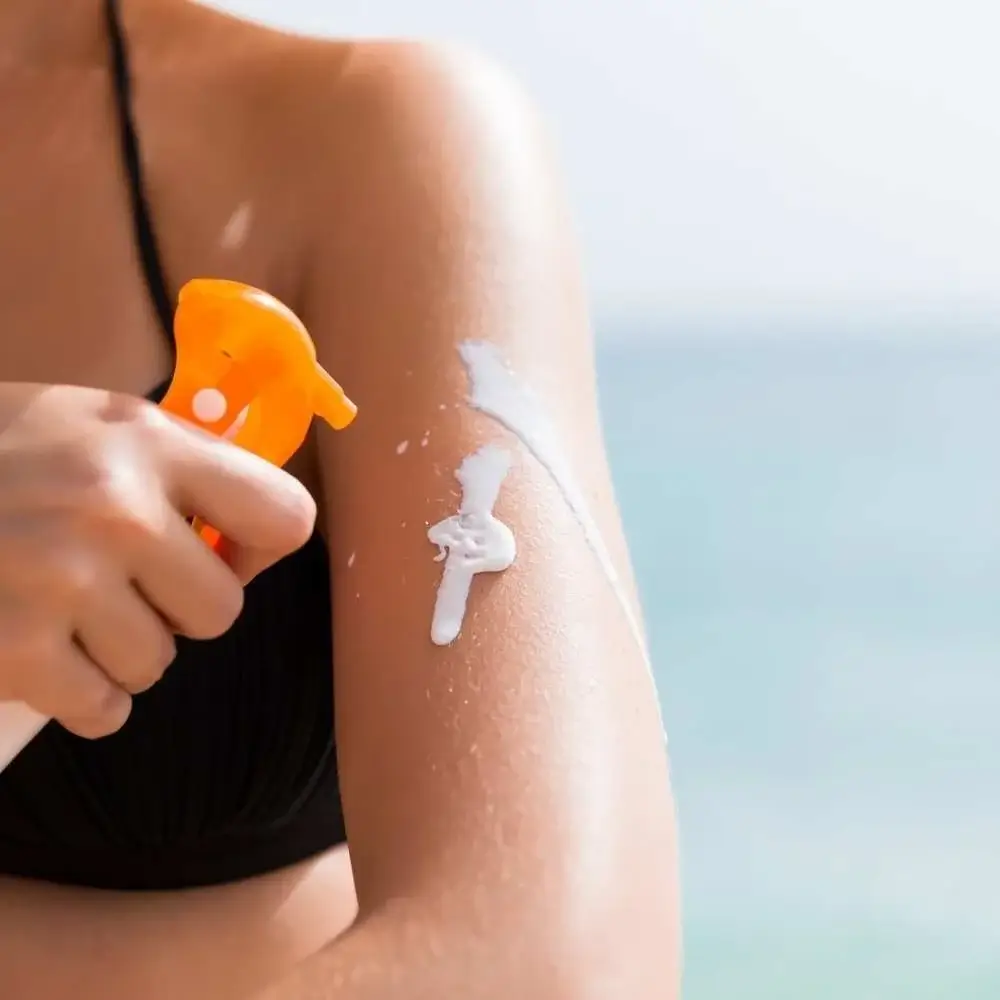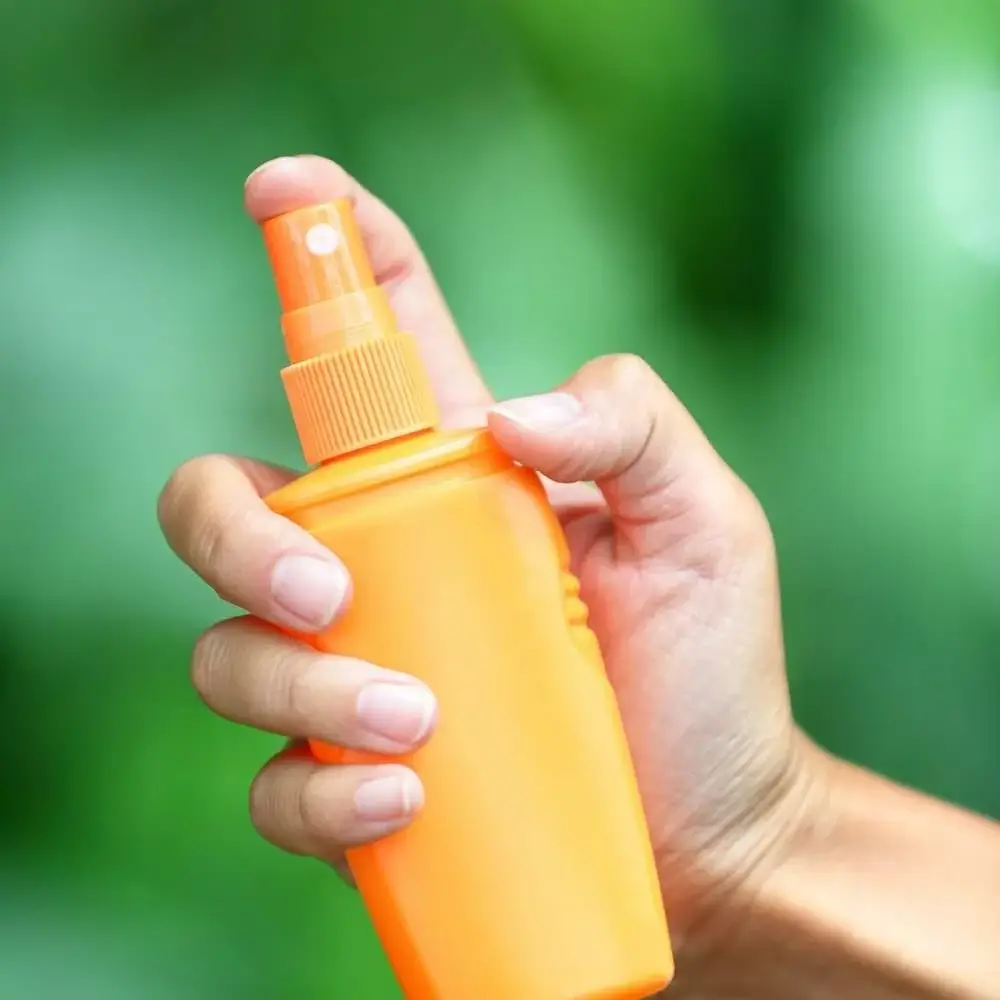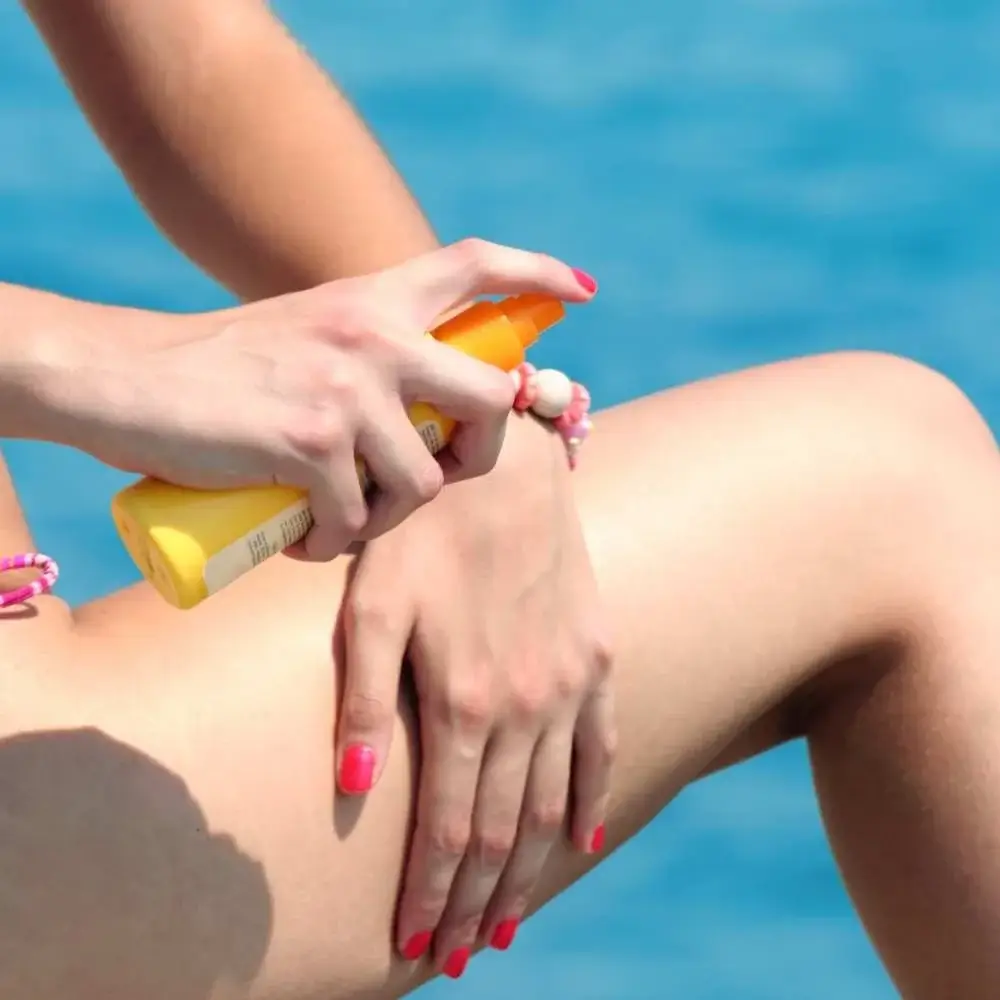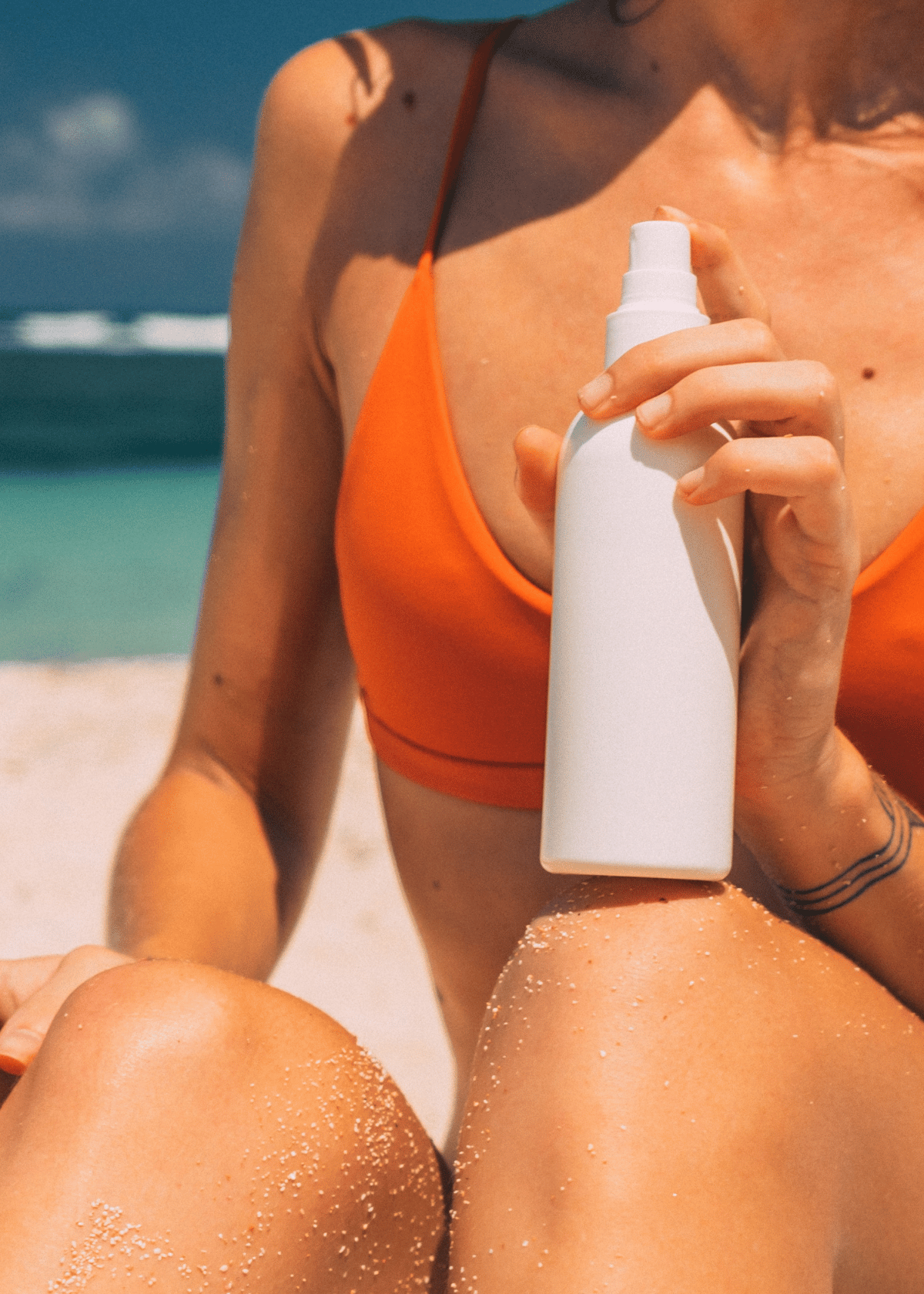Slathering on the right spray sunscreen for your skin type is as essential as finding that perfect summer swimsuit. Think of it as an invisible shield, protecting your precious skin from those relentless sun-kissed bullies. But how do we navigate this ocean of SPF numbers, UVA and UVB rays, broad-spectrum, waterproof, and what seems like a million other sunscreen lingo? Well, grab your beach hats and sunnies, folks, because we're going to make that a breeze.
In this article, we'll dive right into the science of sun protection, decode the sunscreen language, and offer you a personalized guide to choosing the right spray sunscreen for your skin type - because your skin deserves the perfect summer partner. Whether you're a sun worshipper or a shade seeker, keep reading to discover how to keep your skin safe and glowing all summer long. Trust us, even your future self will thank you for this.

Surfing the Sunscreen Wave: Find Your Perfect Right Spray Sunscreen for Your Skin Type
Diving into the world of sunscreen can feel like snorkeling in a sea of confusion. A myriad of brands, SPF numbers popping up like summer freckles, and the importance of finding the one that's made for your skin type - oh boy, it can be quite the pickle. In this sun-kissed post, we're turning on our beach mode and breaking down the sun-protection shenanigans into bite-sized, fun tips to find your right spray sunscreen.
Know Your Skin Like You Know Your Bestie!
First things first - your skin type! Just like you have a different dance move for every tune, your skin needs a different type of care under the sun. For those with dry skin, look for a sunscreen that doubles as your summer romance, offering you moisturizing ingredients like glycerin or hyaluronic acid. If you're on the oily or combo team, aim for an oil-free spray that promises to keep your glow sans the shine. And for my sensitive skin pals, a gentle formula with minimal fragrances and artificial dyes is your skin's best friend.
Solving the SPF Puzzle
Your SPF number is the sun's secret code - the higher the number, the longer the protection. For daily strolls and coffee runs, an SPF 30 would be your ally. If you're planning to sunbathe like a seal, opt for a sunscreen champion, SPF 50+! And don't forget your broad-spectrum coverage to battle both UVA and UVB rays!
Playing Detective with Ingredients
Before you add that spray sunscreen to your cart, put on your detective hat and inspect the ingredients. Keep an eye out for potential party poopers like oxybenzone and octinoxate. If you're rooting for team natural, there are mineral-based sprays featuring the dynamic duo - zinc oxide and titanium dioxide - that won't make your skin rebel.
Choosing the right spray sunscreen doesn't have to feel like finding a seashell in the ocean. With these tips, you'll be a sunscreen whizz in no time, picking a product that suits your skin like the perfect beach dress. And now, for the cherry on the sundae, let's reveal the sun-protection starlet that beauty editors can't stop raving about. Lightweight, non-greasy, and effective, it might just be your next sunscreen BFF. Ready to meet your match? Dive in here to find your new must-have best spray sunscreen! Soak up the sun, not the harmful rays!

Diving Deeper into SPF: The Shield of Your Skin
When we think about the Right Spray Sunscreen for Your Skin Type, SPF (Sun Protection Factor) is a critical component to consider. It's the measure of a sunscreen's ability to defend your skin from UVB rays, the type of radiation that causes sunburn and contributes to skin cancer.
In essence, SPF measures the amount of UV radiation it takes to burn skin protected with sunscreen compared to unprotected skin. For instance, if your unprotected skin starts to redden after 10 minutes in the sun, an SPF 30 sunscreen would theoretically provide 30 times the protection. That's roughly 300 minutes before you start to burn. However, this is an ideal scenario, and in reality, numerous factors can influence this, including skin type, intensity of sunlight, and amount of sunscreen used.
Understanding SPF Levels: What's in a Number?
SPF levels can range from as low as 2 to as high as 100. But does a higher number always mean better protection? Not necessarily. Here's why:
An SPF 15 sunscreen blocks about 93% of UVB rays, while an SPF 30 sunscreen blocks about 97%, and an SPF 50 sunscreen blocks around 98%. As you can see, the increment in protection is relatively minor as we move higher up the SPF scale.
The Right SPF for Your Skin Type
Finding the Right Spray Sunscreen for Your Skin Type involves understanding your skin and its reaction to sun exposure.
Fair Skin Tones
If your skin tends to burn quickly and rarely tans, you are likely to fall into the fair skin category. For this skin type, an SPF of at least 30 is recommended, but you might want to go even higher (up to 50) for prolonged sun exposure.
Medium to Dark Skin Tones
Medium to dark skin tones, which tan more easily and burn less, still require protection. The common misconception is that darker skin doesn't need sunscreen. However, while darker skin may not burn as easily, it can still suffer from sun damage, so an SPF of at least 15 to 30 is still essential.
Choosing the Right Spray Sunscreen for Your Skin Type doesn't end with SPF. Remember, SPF only measures protection against UVB rays. For broad-spectrum protection, your sunscreen should also protect against UVA rays, which penetrate the skin more deeply and contribute to premature aging and skin cancer.
While understanding SPF is crucial in finding the Right Spray Sunscreen for Your Skin Type, remember that no sunscreen can shield you completely from the sun's harmful rays. Therefore, consider other sun-protection measures as well, such as seeking shade during peak sun hours, wearing sun-protective clothing, and wearing a wide-brimmed hat and sunglasses.
In essence, finding the right SPF is a step towards smart sun protection, and this awareness can help safeguard your skin's health and vitality. Because at the end of the day, your skin's defense is only as strong as the shield you provide!

Grasping the Right Spray Sunscreen for Your Skin Type: A Closer Look
Have you ever thought about the right spray sunscreen for your skin type?
Knowing your skin type and understanding how sunscreen works are two critical elements in this quest.
Comprehending Your Skin Type
Skin type is a classification that's primarily based on the amount of sebum production.
There are typically five skin types: normal, dry, oily, combination, and sensitive.
- Normal skin: Balanced hydration levels characterize normal skin. It's neither excessively dry nor oily.
- Dry skin: Characterized by less sebum and insufficient moisture, dry skin tends to feel tight and possibly flaky.
- Oily skin: This type produces an excess amount of sebum, which can lead to a shiny appearance and acne breakouts.
- Combination skin: As the name suggests, combination skin is a mix of both dry and oily skin types. This often presents as an oily T-zone and dry cheeks.
- Sensitive skin: This skin type is prone to irritation, redness, itching, and other allergic reactions.
Recognizing your skin type is the stepping stone towards selecting the right spray sunscreen for your skin type.
Understanding Sunscreen
Sunscreen acts as a protective barrier against the harmful ultraviolet (UV) rays from the sun.
There are two primary types of UV rays:
- UVA rays: These rays penetrate deep into the skin and contribute to premature aging and long-term skin damage.
- UVB rays: Responsible for sunburn, these rays harm the skin's surface layer and can cause DNA damage.
Sunscreen mitigates the harmful effects of these rays, reducing risks like sunburn, skin damage, premature aging, and skin cancer. Different sunscreen formulations exist, including creams, lotions, gels, and sprays. For the purpose of our discussion, we'll focus on spray sunscreens.
The Benefits and Drawbacks of Spray Sunscreens
Spray sunscreens are appreciated for their convenience. Their ease of application, ability to cover hard-to-reach areas, and quick absorption rate make them an attractive option. However, they are not without their downsides. A significant concern is the potential for uneven coverage, making it challenging to ascertain if you're adequately protected. Regardless, there is a suitable spray sunscreen for every skin type. The challenge lies in identifying one that offers sufficient protection while complementing your skin type.
Selecting the Right Spray Sunscreen for Your Skin Type
Here's a succinct guide to selecting the right spray sunscreen for your skin type:
- Normal skin: You can use most sunscreens without issue. Ensure it offers broad-spectrum protection and has a Sun Protection Factor (SPF) of at least 30.
- Dry skin: Look for sunscreens with moisturizing components such as glycerin or aloe.
- Oily skin: Choose an oil-free, non-comedogenic (won't block your pores) sunscreen.
- Combination skin: You might require different sunscreens for different areas, or you could find a formulation suited to all skin types.
- Sensitive skin: Choose sunscreens free of irritants like fragrance and parabens. Sunscreens with calming ingredients like oatmeal are an excellent choice.
Identifying the right spray sunscreen for your skin type is akin to solving a puzzle.
Armed with an understanding of your skin type and how sunscreen works, you can make an informed choice.
The ideal sunscreen is one that you feel comfortable and confident using daily.
Let this guide lead you towards a more sun-safe future. Your skin will thank you!

Checking Ingredients in Sunscreens: A Deep Dive
Are you in the process of locating the Right Spray Sunscreen for Your Skin Type? Brilliant! One of the crucial steps in this journey is getting to grips with the ingredients on your sunscreen label.
Sunscreens generally fall into two main categories: chemical and mineral. Chemical sunscreens operate like sponges, soaking up the sun's rays, whereas mineral sunscreens act as a reflective shield on your skin, bouncing the rays away. Each type has its own set of advantages and disadvantages, but understanding the individual ingredients is the key.
Chemical Sunscreen Ingredients: Chemical sunscreens might include a variety of active ingredients like oxybenzone, avobenzone, octisalate, octocrylene, homosalate, and octinoxate. The safety of oxybenzone and octinoxate has been disputed due to their potential impact on marine ecosystems and human endocrine systems. However, many of the other active ingredients have been deemed safe and effective by the FDA, so it's not about abandoning all chemical sunscreens!
Mineral Sunscreen Ingredients: Alternatively, mineral or physical sunscreens typically contain titanium dioxide and/or zinc oxide. These ingredients provide broad-spectrum protection and work by reflecting the sun's rays. They're less likely to cause irritation and don't penetrate the skin's surface, which makes them a favored option for those with sensitive skin and environmental enthusiasts.
What About Inactive Ingredients: While active ingredients in sunscreens take the limelight, it's vital not to overlook the inactive ones. These could include emollients, preservatives, and fragrance, among others. For those with sensitive skin, it's recommended to opt for fragrance-free sunscreens as fragrances can often cause skin irritation.
Checking ingredients in sunscreens is about more than identifying active ingredients—it’s about knowing your skin type, pinpointing potential skin irritants, and considering your sunscreen’s environmental impact. The right spray sunscreen for your skin type should be one that you're comfortable using every day, provides adequate protection, and aligns with your personal values. It's a small investment to make for the long-term health of your skin and our planet!

FAQs about Choosing the Right Spray Sunscreen for Your Skin Type
How do I choose sunscreen for my skin?
Think of choosing the Right Spray Sunscreen for Your Skin Type like picking out the perfect outfit. You wouldn't wear a winter coat in the middle of a summer heatwave, right? Similarly, your sunscreen needs to match your skin's specific needs. Let's break it down! For oily skin, opt for a non-comedogenic (won't clog pores) sunscreen, which will help keep those pesky breakouts at bay. Dry skin? Look for a moisturizing sunscreen that hydrates while it protects. Got sensitive skin? No worries! Mineral sunscreens, with their gentle ingredients like zinc oxide and titanium dioxide, are your new BFFs. And if you're always on the move, a water-resistant formula will stick with you through sweat and swims. So, slip on that sun-protection 'outfit' that suits your skin the best, and enjoy the glow of healthy, happy skin!
What should I look for in sunscreen spray?
Start by flipping the bottle and inspecting the SPF – that's your 'Sun Protection Factor.' Aim for an SPF of 30 or higher to be a real sun-safe super sleuth. Next up, scout for the term 'broad-spectrum.' This ensures you’re covered against both UVA (those pesky 'Ageing' rays) and UVB (the mischievous 'Burning' rays). And remember, just like in the best detective stories, the 'ingredients list' holds the key. Try to sidestep chemical culprits like oxybenzone and octinoxate, which might play foul with your hormones and the environment. Instead, reach for mineral-based sunscreens with heroes like zinc oxide and titanium dioxide, which are less likely to irritate your skin. Lastly, don't forget to consider your skin type! Dry skin might love a hydrating formula, while oily skin might prefer a matte finish. Now, you're all set to crack the case of the Right Spray Sunscreen for Your Skin Type!
Does skin type matter for sunscreen?
Oh, absolutely! Imagine trying to squeeze into a one-size-fits-all jumpsuit - sounds like a fashion disaster, right? That's the same case with sunscreen. Your skin type is the VIP guest at the sunscreen party. Now, if you're blessed with oily skin, you may want to steer clear of sunscreens that are too greasy or creamy. The Right Spray Sunscreen for Your Skin Type in your case would be a light, oil-free formula that won't clog your pores. Dry skin, on the other hand, loves a bit of extra hydration, so a moisturizing sunscreen would be your skin's new best friend. And for sensitive skin folks, mineral sunscreens that are fragrance-free and packed with soothing ingredients will make your skin feel like it's sipping on a relaxing cup of chamomile tea. So, when you're on a mission for sun protection, remember, your skin type isn't just a plus-one, it's the star of the show!
Is spray sunscreen better for oily skin?
Yes, indeed, spray sunscreen can be a boon for those blessed with an oilier complexion. This type of sunscreen is lighter, dries quickly, and doesn't leave that pesky greasy residue that some lotions do. Moreover, they're easy to apply, and they can help keep your pores from feeling like they're part of an oil production convention. Just remember to look for non-comedogenic on the label - that's the fancy term for "won't clog pores". So, you see, choosing the Right Spray Sunscreen for Your Skin Type, especially if it's oily, doesn't have to be a slick and slippery dilemma!
Is spray SPF effective?
The answer is a resounding YES but with a mini-asterisk attached. Picture this: you're at the beach, and you whip out your Right Spray Sunscreen for Your Skin Type like a sun-slaying superhero. You give it a good shake, hold it a few inches away from your skin, and spray generously. Then, you rub it in for good measure. That's when spray SPF shines! It's a handy-dandy, easy-to-apply tool in your sun-protection kit. But beware, dear sun warrior, because where spray SPF trips up is when it's sprayed lightly, not rubbed in, or applied in a windy environment (there goes half your SPF, carried away with the breeze). So, is spray SPF effective? Absolutely! As long as you're applying it correctly and not just giving your skin a light spritz. Think of it as marinating a good steak - you wouldn't just give it a quick spray, right? You'd make sure it's well-coated and ready to face the heat!
Read our article about best drugstore eyebrow gel here!
Read our article about best shampoo for bleached hair here!
Read our article about best cruelty free lipstick here!







